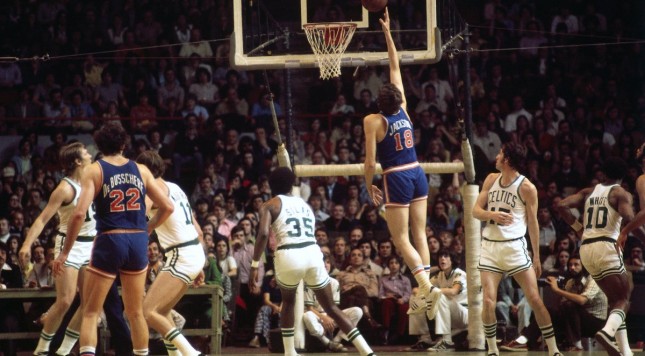Any Game 7 in a conference final carries its down dramatic and personal weight for the competitors involved, but Game 7 of the 2016 Western Conference Finals contains the added weight of history.
So many historical twists and turns end Monday night in Oakland. The NBA will witness a rare occurrence in its 70th season (including its first three seasons as the Basketball Association of American, or BAA).
Let’s start with the cover photo for this story. That’s the New York Knicks and Phil Jackson playing the Boston Celtics in the 1973 Eastern Conference Finals. If any Game 7 in any conference finals series (the NBA’s conference era began with the 1970-1971 season) parallels Thunder-Warriors, it’s Game 7 between the Knicks and Celtics in Boston Garden, 43 years ago.
In 1973, the Knicks — though unlike the Thunder, a championship team in a previous and recent iteration (1970) — had taken a 3-1 series lead, just as Oklahoma City did against Golden State. The Knicks lost Game 5 on the road in Boston and lost Game 6 at home in Madison Square Garden. Their opponent had won 68 games during the regular season. Somehow, the Knicks found a way to push away fear and a sense of resignation. They gathered their strength and won Game 7 in Boston Garden to knock out the Celtics.
In NBA history, multiple 67-win teams have failed to win the title (or even reach the NBA Finals). One was a team the Warriors defeated (the 2007 Dallas Mavericks), and one was a team the Thunder defeated (the 2016 San Antonio Spurs). Only one team with more than 67 wins has ever fallen short of the title (and the NBA Finals): the 1973 Celtics.
Game 7 of Thunder-Warriors is a Western (and modernized) update of 1973 Knicks-Celtics.
*
Here’s more on the history hanging in the balance in Oracle Arena:
Either Billy Donovan becomes the second straight first-year head coach to win the Western Conference championship, creating the second straight NBA Finals matchup of rookie head coaches, or Steve Kerr becomes just the sixth coach in NBA history — dating back to the league’s first season as the Basketball Association of America (BAA) in 1946-1947 — to make the NBA Finals in each of his first two seasons in the league.
(The other five men: Eddie Gottlieb of the 1947 and 1948 Philadelphia Warriors; John Kundla of the 1949 and 1950 Minneapolis Lakers; Charles Eckman of the 1955 and 1956 Fort Wayne Pistons; Alex Hannum of the 1957 and 1958 St. Louis Hawks; and a fellow named Pat Riley, of the 1982 and 1983 Los Angeles Lakers.)
*
Either Oklahoma City will become the eighth team in NBA history to win a Game 7 on the road after leading a series 3-1, or Golden State will become the tenth team to come back from a 3-1 deficit.
Either Oklahoma City will become the third team in conference finals history to win Game 7 on the road after leading a series 3-1, or Golden State will become the third team in conference finals history to pull off a 3-1 series comeback.
Either Oklahoma City will become the 25th team to win a road Game 7 in NBA history, or Golden State will extend the home team’s winning streak in Game 7s to… seven games.
Either Oklahoma City will make its second NBA Finals appearance, or Golden State will make its third (though the franchise’s fifth since relocating to the San Francisco Bay Area from Philadelphia before the 1962-1963 season).
Either a non-Texas, non-California franchise (OKC) will represent the West in the NBA Finals for the second time since 1998, or the West will feature its second straight back-to-back conference champion (the Warriors would join the 2013 and 2014 Spurs) and the third back-to-back champion in the past eight seasons (the 2009 and 2010 Lakers).
Either Kevin Durant and Russell Westbrook get to play for their first NBA championship against the city of Cleveland — also looking for its first NBA title — or the league gets a rematch of the 2015 Finals.
*
As far as Game 7s go, this one carries more historical resonance than usual.
Buckle up.

